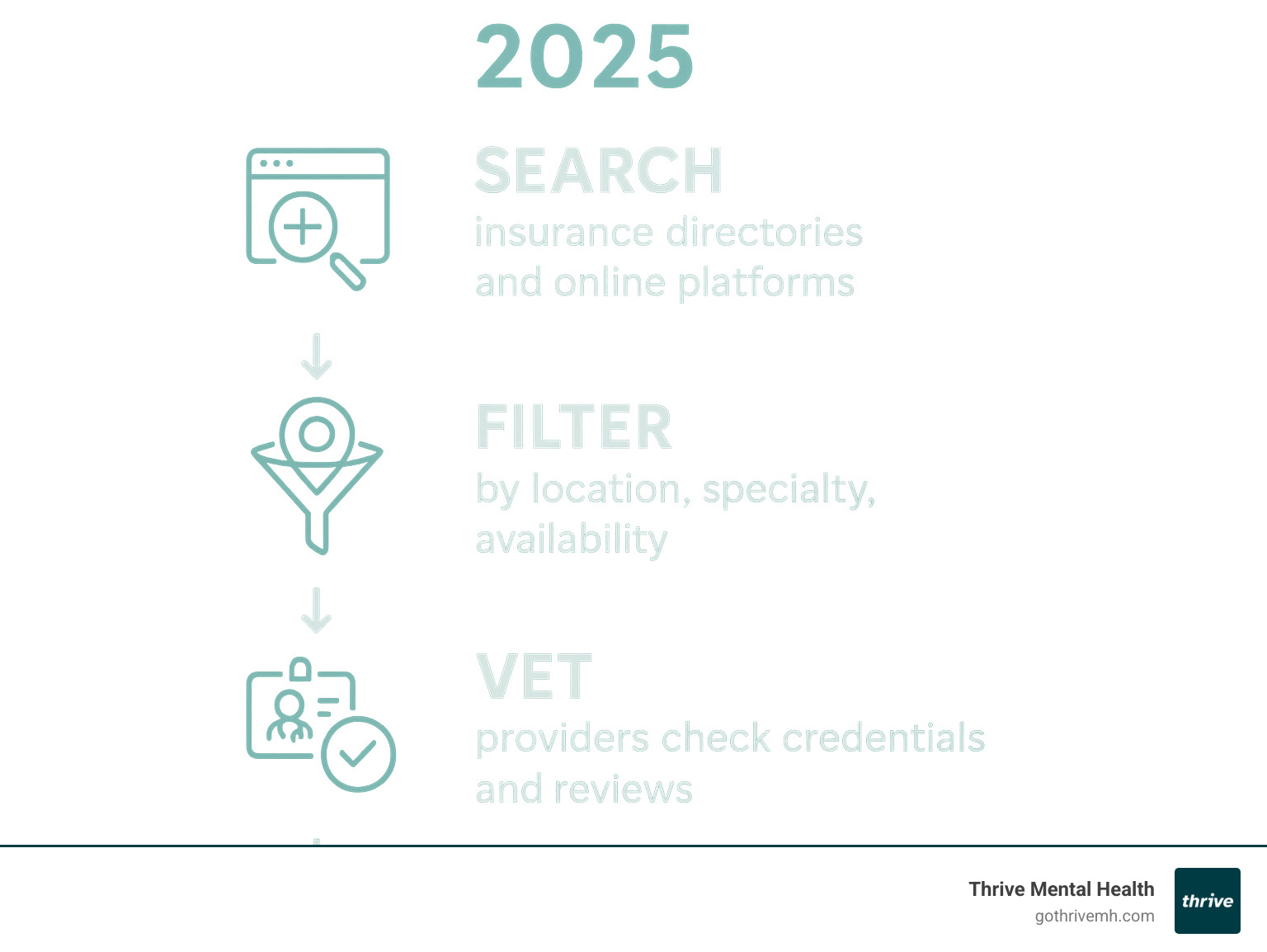No More Waiting Rooms! Quick Tips to Find Doctors Near Me

Breaking Free from Healthcare Hassles: Your Path to Better Medical Care
Finding doctors near me is easier than ever, but knowing where to start can still feel overwhelming. Whether you need a primary care physician, specialist, or urgent care, the key is using the right resources to quickly filter your options.
Quick Ways to Find Doctors Near You:
- Search your insurance provider’s website – Find in-network doctors to minimize costs
- Use online directories – Platforms like Zocdoc, Healthgrades, and Medicare.gov offer comprehensive listings
- Check hospital networks – Major health systems list their affiliated physicians online
- Try telehealth platforms – Access licensed doctors virtually for many common health needs
- Contact local health departments – Get referrals to community health centers and clinics
The healthcare landscape has shifted. Forget flipping through phone books or waiting weeks for referrals. Today’s digital tools put provider information, from patient reviews to real-time appointment availability, at your fingertips.
For busy professionals dealing with anxiety and depression, this accessibility is game-changing. Virtual consultations and same-day bookings mean you can prioritize your health without derailing your work schedule.
I’m Nate Raine, CEO of Thrive Mental Health. I’ve spent over a decade helping people steer healthcare systems. My experience shows that the right search strategy can dramatically reduce wait times and improve care quality.

Your First Step: Where to Search for Doctors Near Me
Finding the right healthcare provider starts with knowing where to look. Simply typing “doctors near me” into Google is just the beginning. The real magic happens when you tap into the right resources that can connect you with qualified professionals who meet your specific needs.
Using Online Doctor-Finder Tools
Online doctor-finder tools have changed the game, letting you search, filter, and book appointments without picking up the phone. Be specific with your search terms. Instead of just “doctors near me,” try “family doctor + [your zip code]” or “dermatologist + [your neighborhood].”
Most healthcare directories offer filters for specialty, gender, languages spoken, and whether they’re accepting new patients. Many also include patient reviews and quality ratings, giving you a peek into other patients’ experiences. This data helps you make smarter choices about your time and care.

Checking Your Insurance Provider’s Network
This step can save you serious money. In-network doctors cost significantly less than out-of-network providers because your insurance company has negotiated rates with them.
Most insurance websites have a “Find a Doctor” tool where you can search by specialty, location, and new patient availability. If you have Blue Cross Blue Shield, their website offers a comprehensive Find a Doctor – Specialist or Dr Finder | bcbs.com tool. Other insurance companies have similar features. This is your first line of defense against surprise medical bills.
If you can’t find what you need online, call your insurance company’s member services line for help.
Leveraging Government and Hospital Resources
Government agencies and hospital networks are often overlooked resources. Your local health department can provide lists of community clinics and public health services.
Medicare beneficiaries have access to an incredible tool through the official Medicare.gov website. You can Find doctors & clinicians near me – Medicare and compare their quality ratings and patient survey results.
Major hospital systems maintain online directories of their affiliated physicians. This is useful if you have a preferred hospital or need a doctor within a larger healthcare system. Academic medical centers are particularly valuable as they are often at the forefront of medical research and offer access to a wide range of specialists.
Decoding Your Healthcare Options: What Kind of Doctor Do You Need?
When you’re searching for doctors near me, the most important question isn’t just “where” but “what kind.” Different health concerns call for different medical experts. Let’s break down your options so you can find exactly the right care for your needs.

Primary Care Physicians (PCPs) and Family Doctors
Your primary care physician (PCP) is your first stop for most health concerns, from yearly check-ups to managing ongoing conditions. Family doctors care for all ages, while internal medicine physicians focus on adults. Both serve as your healthcare quarterback, coordinating with specialists when needed. If you don’t have a PCP yet, this is usually the best place to start. They provide preventative care and know when it’s time to bring in a specialist.
Walk-In Clinics and Urgent Care Centers
Walk-in clinics and urgent care centers handle immediate, non-life-threatening situations that can’t wait but don’t require an emergency room visit. They’re perfect for things like colds and flu, minor injuries, or when you need care after regular hours. Think of urgent care as the middle ground between your regular clinic and the ER, designed to get you seen quickly for common problems.
Medical Specialists for Focused Care
Sometimes your health concern needs a specialist’s focused expertise. Cardiologists focus on the heart, dermatologists on skin, and neurologists on the brain and nervous system. Each specialist has years of additional training in their specific area. Usually, you’ll need a referral from your primary care physician to see a specialist, especially if you want insurance coverage.
Mental Health Professionals: Finding the Right Doctors Near Me
Mental health care is just as important as physical health. Here’s a breakdown of providers:
- Psychiatrists are medical doctors who can diagnose conditions, prescribe medication, and provide therapy. They are often the starting point for conditions like depression or anxiety that may benefit from medication.
- Psychologists typically hold doctoral degrees and are experts in therapy and psychological testing. They can’t prescribe medication but are skilled in helping you manage your thoughts and emotions.
- Therapists and counselors provide talk therapy for everything from stress and relationship issues to anxiety and depression.
When searching for mental health doctors near me, consider if you need medication management, talk therapy, or both. We understand that finding the right support can feel overwhelming. That’s why we’ve created resources like our Key Considerations in Choosing a Mental Healthcare Provider and our Guide to Finding Your Ideal Behavioral Health Therapist. For those concerned about costs, we also have information on finding a Medicaid Covered Psychiatrist.
Finding the right mental health professional is about finding someone who makes you feel heard and supported. The right therapeutic relationship can be life-changing.
The Rise of Virtual Care: Accessing a Doctor from Anywhere
The healthcare world has changed dramatically over the past few years. What used to require a trip to the doctor’s office can now happen right from your kitchen table. Virtual care has brought doctors near me directly into our homes, making healthcare more accessible than ever before.
This digital shift isn’t just about convenience – it’s about breaking down barriers that have kept people from getting the care they need. Whether you’re dealing with a busy work schedule, transportation challenges, or simply prefer the comfort of your own space, telehealth and telemedicine have opened up new possibilities for connecting with healthcare professionals.

Benefits and Limitations of Online Consultations
Virtual care has transformed how we think about accessing healthcare. The convenience factor alone is game-changing – no more rushing through traffic to make an appointment or sitting in crowded waiting rooms. You can literally consult with a licensed healthcare professional from your couch, your office, or even that quiet corner of your favorite coffee shop.
The speed of access is another huge win. Many virtual platforms offer same-day appointments, and some even provide immediate consultations. We’ve seen platforms save users thousands of hours that would have been spent waiting in clinics. For busy professionals juggling work and health concerns, this efficiency can be life-changing.
Virtual care also expands your options beyond geographical boundaries. You’re no longer limited to just the doctors physically located near you – you can connect with specialists from different cities or even states, opening up access to expertise that might not be available locally.
But let’s be honest about the limitations too. The biggest challenge is the absence of physical examination. A doctor can’t listen to your heartbeat through a screen, feel for lumps, or get a detailed look at that suspicious mole. This means virtual care isn’t suitable for emergencies (always call 911 for those!), complex diagnoses requiring hands-on assessment, or any procedures.
You’ll also need reliable technology – a stable internet connection, a device with a camera, and a private space for your consultation. While these requirements are becoming easier to meet, they can still be barriers for some people.
| Factor | In-Person Doctor Visits | Virtual Doctor Visits |
|---|---|---|
| Cost | Varies, typically includes co-pay/deductible. | Often covered by insurance; sometimes lower out-of-pocket. |
| Convenience | Requires travel, parking, waiting room time. | From anywhere, no travel, minimal wait time. |
| Scope of Care | Full physical exam, in-office procedures, lab tests. | Consultations, prescriptions, referrals, mental health. |
| Emergencies | Appropriate for severe, life-threatening conditions. | Not suitable for emergencies. |
| Technology | None required beyond phone for scheduling. | Internet connection, device (computer/smartphone). |
| Privacy | Private room in clinic/office. | Secure platform, but need private space. |
What Services Can You Access Virtually?
You might be surprised by how much healthcare you can access from your living room. Virtual care has expanded far beyond simple consultations to cover a wide range of medical needs.
General consultations work well for many common health issues. That persistent cough, seasonal allergies, or skin concerns like acne can often be effectively addressed through a video call. Many doctors have become skilled at diagnosing and treating routine conditions remotely.
Prescription refills are particularly convenient through virtual platforms. If you’re managing ongoing conditions with stable medications, you can often get your prescriptions renewed without an in-person visit. This saves time and ensures you don’t run out of important medications.
Virtual doctors can also handle lab requisitions and referrals. After your consultation, they can send lab orders directly to facilities near you or provide referrals to specialists when needed. This streamlines the process and keeps your care moving forward.
Mental health therapy is where virtual care truly shines. Online therapy and psychiatry sessions have proven incredibly effective and convenient. You can connect with licensed therapists and psychiatrists from the comfort of your own space, which can actually make it easier to open up and engage in treatment. This has been transformative for people dealing with anxiety, depression, ADHD, and other mental health conditions.
For those with chronic conditions, virtual check-ups can help monitor progress and adjust treatment plans. If your condition is stable, regular virtual visits can help maintain your health without the hassle of frequent office visits.
The flexibility of virtual care has made comprehensive mental health treatment more accessible than ever. Our Virtual Intensive Outpatient Program Near Me demonstrates how effective and accessible intensive mental health treatment can be when delivered virtually. It means you can prioritize your well-being without geographical constraints or scheduling conflicts that might otherwise prevent you from getting the help you need.
The Practicalities: Booking, Costs, and Quality Checks
You’ve done your research, figured out what type of doctor you need, and narrowed down your options. Now comes the exciting part – actually booking that appointment and making sure you’re getting quality care without breaking the bank. This is where your search for doctors near me transforms from browsing to booking.
How to Book an Appointment with doctors near me
Gone are the days when booking a doctor’s appointment meant playing phone tag with busy receptionists. Today’s healthcare world offers multiple ways to secure your spot, and honestly, it’s pretty convenient once you know your options.
Online booking systems have become the gold standard for many clinics. These platforms show you real-time availability, let you pick your preferred time slot, and often send helpful reminders so you don’t accidentally miss your appointment. Some platforms even boast impressive stats – like helping patients book appointments 60% faster than traditional methods. It’s like having a personal assistant for your healthcare needs.
But don’t worry if you’re more of a traditional phone caller – that method still works perfectly well. In fact, it’s often necessary for new patients who need to provide detailed insurance information or discuss specific concerns. When you call, have your insurance card handy and be ready to briefly explain why you’re seeking care.
For those “I need to see someone today” moments, same-day appointments and urgent bookings are your lifeline. Walk-in clinics and urgent care centers are designed exactly for this. They typically operate on a first-come, first-served basis, though calling ahead can save you from a long wait. Many family doctors also keep a few emergency slots open each day, so it’s worth checking with your primary care physician’s office first.
Understanding the Costs: Insurance and Payments
Let’s be real – healthcare costs can feel like a puzzle wrapped in a mystery. But understanding how your visit will be covered doesn’t have to give you a headache.
If you’re covered by public health plans (like those in Canada), many doctor visits are free at the point of service. Your provincial health card is your golden ticket to covered care. Medicare serves as the primary coverage for those 65 and older or with certain disabilities, while Medicaid provides essential coverage for individuals and families with limited income.
Private insurance comes with its own vocabulary lesson. Your co-pay is that fixed amount you pay at each visit – think of it as your entrance fee. Your deductible is the amount you need to pay out of pocket before your insurance kicks in to help. Understanding these numbers ahead of time means no surprises at checkout.
Here’s a pro tip: always confirm your coverage with your insurance provider before your appointment. Most doctor’s offices are also happy to verify your benefits and discuss payment options. Don’t be shy about asking – they want you to understand the costs just as much as you do.
How to Vet a Doctor Before You Visit
Choosing a doctor is like choosing any important professional in your life – you want someone qualified, trustworthy, and right for your needs. The good news is that vetting a healthcare provider has never been easier.
Board certification is your first checkpoint. This certification means the doctor has met rigorous national standards in their specialty. Most medical boards maintain online databases where you can verify this information quickly. Medical licenses are equally important – you want to ensure your doctor is licensed to practice in your state or province.
Patient reviews and ratings offer valuable insights into what it’s actually like to be treated by this doctor. While reviews are subjective, look for patterns in feedback about communication style, office wait times, and overall patient experience. A few negative reviews aren’t necessarily red flags, but consistent complaints about the same issues might be worth noting.
Hospital affiliations can tell you a lot about a doctor’s connections within the healthcare system. If you have a preferred hospital or anticipate needing specialized care, knowing where your doctor has privileges can be important.
For those who love digging into data, you can Visit the data catalog on Data.cms.gov for comprehensive information on Medicare-approved providers. It’s like having access to the healthcare industry’s report card.
When you contact a potential new doctor’s office, having key questions ready shows you’re a thoughtful patient. Ask about accepting new patients, insurance acceptance, office hours, and after-hours emergency procedures. You might also want to know about their philosophy on patient care, typical appointment length, and average wait times. These questions help you understand not just their qualifications, but whether they’re a good fit for your lifestyle and healthcare needs.

Frequently Asked Questions about Finding a Doctor
Finding doctors near me can feel overwhelming, especially when you’re dealing with health concerns and just need answers. We hear these questions all the time and want to make the process clearer.
What should I do if I don’t have a family doctor?
Being without a family doctor doesn’t mean you’re without care. Start with immediate needs first; if you have urgent health concerns, head to a walk-in clinic or urgent care center. While handling pressing issues, begin your search for a long-term primary care physician. Your insurance provider’s website is your best friend here—use their “Find a Doctor” tool to locate PCPs accepting new patients. Many online directories also let you filter for doctors welcoming new patients. Virtual care platforms can be a lifesaver during this transition, perfect for basic consultations and prescription refills while you search for a permanent PCP. Some states also have centralized resources to help you find a provider, so check your local health department’s website.
Can I get a same-day or urgent appointment?
Absolutely! The healthcare world has gotten much better at accommodating urgent needs. Walk-in clinics and urgent care centers are your go-to for immediate care and often have extended hours. Some large clinics offer even more comprehensive walk-in services, sometimes with on-site diagnostics. Don’t overlook your regular family doctor’s office either. Many family practices reserve a few “urgent” slots each morning for established patients; call right when they open. Online platforms and telehealth services have also revolutionized same-day access, with many offering immediate virtual consultations. The trick is to check real-time availability online or by calling ahead to save time.
How do I find a doctor for a specific need, like an immigration medical exam?
For government-mandated exams like immigration medicals, you must use an approved ‘Panel Physician’ or ‘Civil Surgeon’—not just any doctor. These physicians are specifically authorized by the governing immigration body, such as U.S. Citizenship and Immigration Services (USCIS). They are trained on the exact requirements for these specialized medical examinations. You’ll find lists of these approved doctors on the official government immigration websites, not through general doctor-finder tools. Using an authorized physician ensures your results will be accepted for your application, saving you significant time and stress.
Conclusion
Finding the right doctors near me has never been more achievable, and honestly, that’s something worth celebrating. We’ve walked through this journey together, from understanding where to search and what type of care you need, to booking appointments and ensuring you’re choosing quality providers.
The healthcare world has transformed dramatically. What once required phone calls, long waits, and endless paperwork can now often be accomplished with a few clicks. Online directories connect you with specialists, insurance websites help you stay in-network, and virtual consultations bring expert care right to your living room.
But here’s what really matters: you’re now equipped to take charge of your health journey. You know that being proactive beats waiting for a crisis. You understand that technology can be your best friend when you need care quickly. You’ve learned that different health concerns require different approaches, whether that’s a quick urgent care visit or a thoughtful search for the right mental health professional.
Quality matters, and you now know how to spot it. Board certifications, patient reviews, and hospital affiliations aren’t just fancy terms – they’re your tools for finding providers who truly care about your well-being.
At Thrive Mental Health, we’ve seen how the right support can transform lives. When you combine accessible care with expert guidance, amazing things happen. Mental health support shouldn’t feel like an uphill battle, and with today’s flexible options – from virtual therapy sessions to intensive outpatient programs – it doesn’t have to be.
Your health journey is uniquely yours, but you don’t have to steer it alone. Whether you’re dealing with anxiety, depression, or simply want to prioritize your mental well-being, the right professionals are out there, ready to support you.
For those ready to explore how insurance can make expert-led mental health care more accessible, we invite you to Find how your insurance can cover expert-led care. Because taking care of your mental health isn’t just important – it’s essential for living your best life.